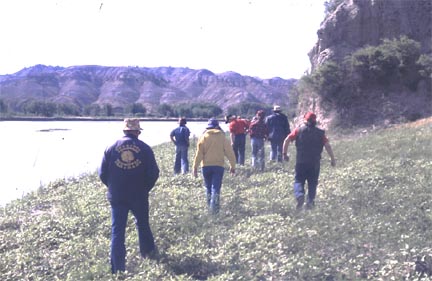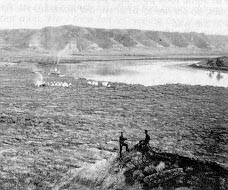

The Nez Perce crossed at Cow Island, twenty-four miles down-stream from the Stafford Ferry. Although steamboats could travel as far upriver as Fort Benton during spring runoff, the lower water of summer and fall meant that Cow Island was the farthest upstream boats could run. Freight was off-loaded at Cow Island and stored beside a bluff in an open-air depot. Bull trains then carried the freight on to Fort Benton. Guarding the freight at Cow Island in September 1877 were twelve sol-
diers and three civilians.

The Cow Island landing on the Missouri River as it appeared in 1880.
I think it was the first week of September when the last boat came down from Fort Benton, when we received orders to make out a detail of one none-commissioned officer and six privates to go down to Cow island to guard the freight.... Before we started I reported to the Capt. and the last word he said to me "Sergt. be careful and keep a good lookout. I was advised that the Nez Perce are coming this way" Well, we went down the river, neither one of us being in Cow Island before didn't know exactly where it was till we came to a big bend in the river and saw some smoke coming up.... We pulled down and I proceeded at once to get the rations ready... When I told the boys what the Capt had told me of course they, like all soldiers, got kidding about it and all said, -Well, let them come, we are here first.' I walked down toward the freight pile when I heard the bo s shouting, "They are coming — look across the river!' and sure enough there they were on the brow of the hill in single file on horseback....
It wasn't long before 2 Indians came toward our camp when I stopped them and was going out to meet them when one of these civilians said to me, "Sergt. let me go out and see what they want, I have lived among Indians for many years and understand their ways." I said, 'AII right.' He went out but hurried right back again and came back to the breastworks and said, 'They won't have anything to do with me, they want to see the man in charge of the soldiers." I picked up my rifle to go when the civilian said, 'You don't need that now, they won't harm you now.' So took his advice and left my gun behind and went out when to my surprise they spoke English as well as anyone could. They asked me for some of that freight, when I told them I could not give them any and walked away they went and came back the second time and I met them when they offered me money if I would sell them some of the freight as they were hungry and nothing to eat. I turned back to the breastworks and they came back the third time and pleaded with me for something to eat so then I went back to the breastworks and put a side of bacon in a sack filled about half full with hardtack, took it out to them and they very kindly thanked me for the same. Things went along for a while quietly till we saw an Indian coming between our breastworks and the foot hills stripped naked when we know this means fight.... This was sundown and from that time on till daybreak we were fighting for our lives. Of course the freight we could not save as it was piled right up against the bluff.
Sgt. William Moelchert
The seven hundred People were hungry. They had politely asked for some of that fifty tons of supplies; they had even offered to pay. Native American custom was to share whatever food they had with guests and strangers. The parsimonious offer of a side of bacon and half a bag of hardtack must have been insulting. Once again the whites had unwittingly declared themselves as adversaries. The Nez Perce responded accordingly.
There was a coulee just north of the pile of freight that led back from the river and through this coulee the Indians were able to get at the pile of freight without us being able to see them. Working on the side of the freight pile furthest away from us they carried away everything they wanted and set fire to the rest.
Michael Foley
Cow island clerk
We took whatever we needed, flour, sugar, coffee, bacon, and beans. Anything whoever wanted it. Some took pans and pots for the cooking. We figured it was soldier supplies, so set fire to what we did not take. We had privilege to do this. It was in the war.
Peopeo Tholekt